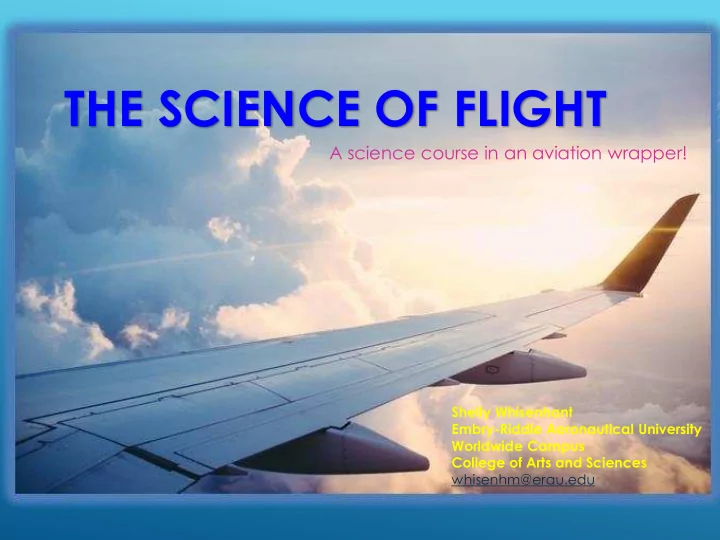

THE SCIENCE OF FLIGHT A science course in an aviation wrapper! Shelly Whisenhant Embry-Riddle Aeronautical University Worldwide Campus College of Arts and Sciences whisenhm@erau.edu
PRESENTATION OBJECTIVES • Describe and preview the course, highlighting the original aspects of the course design and varied types of activities and learning assets • Engage the group on the pedagogical aspects of the course content and structure
THE SCIENCE OF FLIGHT BACKGROUND Developed in 2018 by Shelly Whisenhant (Physics/Meteorology) & Emily • Faulconer (Biology/Chemistry/Environmental Science), ERAU-Worldwide 9 week online introductory (100-level) science course providing students • with a basic level of understanding of the application of various science disciplines to flight: Physics: aerodynamics and airplane performance; fluid mechanics and aircraft hydraulics; flight planning Biology: Biomechanics of flight; altitude physiology Meteorology: weather and its impacts in aviation Chemistry: fuels in aircraft propulsion; metals and composites used in aircraft Environmental Science: impacts of aviation on the environment, and vice-versa A physical science elective option in many undergraduate programs •
THE SCIENCE OF FLIGHT MINI-LECTURES Original content created • by the course developers integrates two different • personalities and presentation styles into the course content Built into the Canvas • course with the help of instructional designers. Connect concepts and • their applications to flight Combine textbook • reading assignments, text and graphics, web resources, video, interactive learning objects, self-checks and example problems.
THE SCIENCE OF FLIGHT GRADED ACTIVITIES Weekly “Putting It All Together” Discussions Two Demonstration of Mastery Exercises (DOMEs) Paper Airplane Team Project (over 5 weeks) Weekly “Concept Check” Quizzes
THE SCIENCE OF FLIGHT “ PUTTING IT ALL TOGETHER” DISCUSSIONS Varied format All are focused on: direct applications of science in aviation teaching something to your peers enhancing content with visual aids making connections to personal and professional experiences Detailed instructions and rules to facilitate learning and engagement
THE SCIENCE OF FLIGHT “ PUTTING IT ALL TOGETHER” DISCUSSIONS
THE SCIENCE OF FLIGHT “ PUTTING IT ALL TOGETHER” DISCUSSIONS
THE SCIENCE OF FLIGHT DEMONSTRATION OF MASTERY (DOME) EXERCISES Involve critical thinking, quantitative reasoning, and application and synthesis of concepts • 2 nd Week – students apply the scientific method – formulate hypotheses, perform experiments, collect and analyze data using a simulation of the atmospheric greenhouse effect, and draw conclusions regarding potential impacts to flight. • Final Week - Formulate an evidence-based argument on the impacts of aviation on climate change AND the impacts of climate change on aviation.
THE SCIENCE OF FLIGHT PAPER AIRPLANE PROJECT Students “Role play” as paper glider competition teams, and collaborate to build and test paper glider designs in preparation for a high level glider competitions for both flight distance and flight duration . Takes place in steps over 5 weeks: Team formation activity – “warm 1. up” activity to generate synergy and get oriented to the virtual collaboration space Collaborate to choose two glider 2. designs that they will build and test Build and scientifically test each 3. design individually, and then report results to team Collaborate to determine needed 4. design modifications based on testing results Collaborate to generate final 5. report Designing Effective Team Projects in Online Courses (Faculty Focus, 2016)
THE SCIENCE OF FLIGHT CONCEPT CHECKS Assess most of the module objectives Test basic concept understanding and application/analysis – questions based mainly on mini-lecture content Timed (1 hour), two attempts 10-15 questions of various question types including one short answer/essay Students have one opportunity to review the quiz, immediately after submission Questions contain built-in feedback to promote learning and success on 2 nd attempt
THE SCIENCE OF FLIGHT CANVAS COURSE PREVIEW
WHAT DO THEY THINK? STUDENT END-OF-COURSE EVALUATIONS Numbers-wise: slightly above the college and campus average in course experience scores “Had a great time taking this course.” Very fun class!! The paper airplane project was excellent! I thoroughly enjoyed this course and found it fun and interesting. I liked the format of the Mini-Lectures Mixed reviews on paper plane project: Challenges of collaborating in the virtual environment Challenges of team projects in general May need to dial it back a bit – combine individual work with collaboration on some parts
QUESTIONS FOR DISCUSSION What are your thoughts about or experiences with: • Integrating interdisciplinary science courses in secondary or undergraduate general education curriculum? • Team-development of integrated subject courses? • Team projects in online courses? • Allowing two attempts on quizzes/tests? • Asynchronous discussions in online science courses? Can you identify ways to employ any of this course’s activities into your course?
Recommend
More recommend